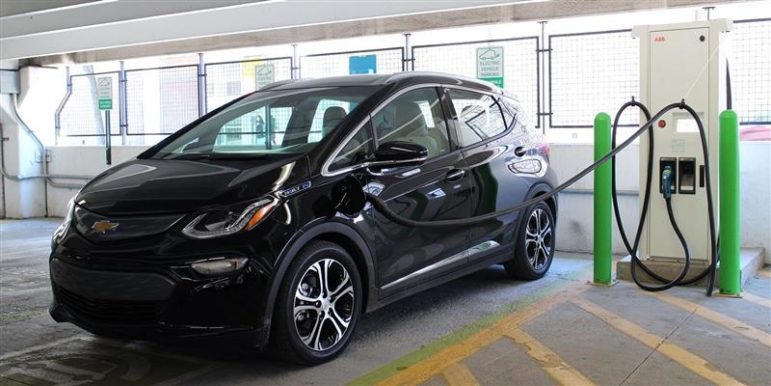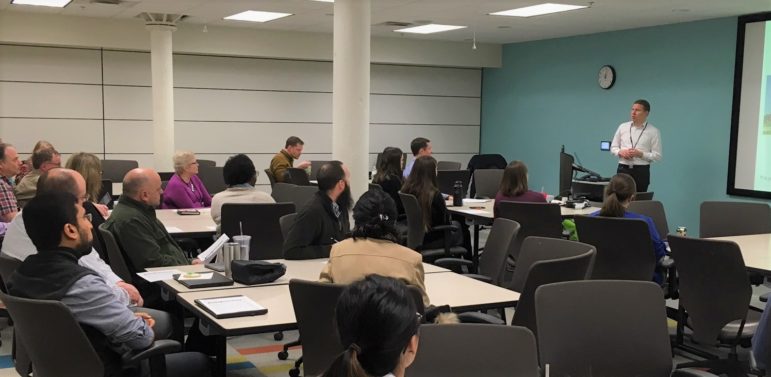
Minnesota is poised to dramatically reduce its transportation energy consumption, air pollution, and greenhouse gas emissions by shifting to electric vehicles (EVs). As manufacturers announce ambitious new goals, like GM’s plan to eliminate fossil gas cars and SUVs by 2035, we are also seeing states gearing up for more EVs on the road. In fact, the Minnesota Department of Transportation has an EV Strategic Planning process underway to set the state up for success as more EVs hit the road—a process in which Fresh Energy staff are playing a key role. Learn more and join the agency’s online events May 17-26.
To support and facilitate the expected increase in EVs, charging infrastructure must be considered in the design of every building project, prompting Shift2Electric and Fresh Energy to craft a continuing education course designed for architects, engineers, contractors, and realtors—as well as anyone else who is interested.
Transitioning to zero-carbon transportation will not change how we all go about our day, but it will establish new charging and infrastructure expectations for building owners, electric utilities, and businesses—and we need to start planning for that transformation now.
Because 85 percent of EV charging happens overnight at home, residential properties—including apartment buildings and condominiums—will need to be some of the first buildings that are EV-ready. While not every parking spot will need a charging station just yet, charging infrastructure installations will be much more affordable if properties are designed with future needs in mind.
Our 90-minute seminar—worth 1.5 General GCBI CE credits or 1.5 LU|HSW credits—offers insights to participants from across the region on:
- Basic electric vehicle and charger technology, models, and what to expect from this evolving market;
- Insight into how EV owners use and charge their vehicles, and how that impacts energy consumption and greenhouse gas emissions;
- Safety, common concerns, and challenges in installing cost-effective, safe, and future-proof charging infrastructure to multi-family buildings and commercial properties;
- Code developments and safety aspects related to EV charging in property design and development;
- And more.
Interest in the seminar has been strong with nearly ten trainings offered in just the first few months. After the seminar, attendees have circled back and shared immediate practical takeaways that they intend to implement in current projects. One project, for instance, was a hotel under design. As a result of the seminar, the architectural team redesigned the proposed infrastructure to better accommodate future demand for EV charging stations for overnight guests. Another participant relocated charging stations at a hospital from an outdoor parking lot used only by day visitors to an interior site where hospital staff parked overnight and would have greater charging needs.

Architects and developers make thousands of design choices across the lifespan of a building project and it’s crucial that they have the tools and information they need to make right choices for sustainable, long-term EV infrastructure.
But the conversation and learning during the seminar doesn’t stop at project design insights. Participants are often eager to discuss their personal EV needs, with many growing families curious about how an electric minivan or other larger EV might serve their families’ needs.
How we get around is changing quickly. Our idea of what “electric vehicle” means can no longer be confined merely to the cars and trucks on the road—it must now also include the charging infrastructure needed to power those vehicles.
Fresh Energy is committed to leading a healthy transition from fossil fuel to clean, renewable electricity to power our homes, cars, and buses. Equipping local architects and developers to incorporate EV charging infrastructure readiness into new construction and remodeling projects is one way Fresh Energy is being proactive in the ongoing transition to zero-carbon transportation. An independent nonprofit organization working purely in the public interest, Fresh Energy appreciates the philanthropic supporters who make this work possible, and we are pleased to offer our continuing education events free of charge.
Schedule a CE course for your workplace! Get in touch with course instructor Jukka Kukkonen, Chief EV Educator and Strategist for Shift2Electric, via this contact form.
